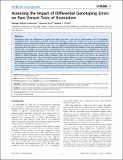Assessing the Impact of Differential Genotyping Errors on Rare Variant Tests of Association
Author(s)
Fast, Shannon Marie; Mayer-Jochimsen, Morgan; Tintle, Nathan L.
DownloadMayer-Jochimsen-2013-Assessing the Impact.pdf (695.0Kb)
PUBLISHER_CC
Publisher with Creative Commons License
Creative Commons Attribution
Terms of use
Metadata
Show full item recordAbstract
Genotyping errors are well-known to impact the power and type I error rate in single marker tests of association. Genotyping errors that happen according to the same process in cases and controls are known as non-differential genotyping errors, whereas genotyping errors that occur with different processes in the cases and controls are known as differential genotype errors. For single marker tests, non-differential genotyping errors reduce power, while differential genotyping errors increase the type I error rate. However, little is known about the behavior of the new generation of rare variant tests of association in the presence of genotyping errors. In this manuscript we use a comprehensive simulation study to explore the effects of numerous factors on the type I error rate of rare variant tests of association in the presence of differential genotyping error. We find that increased sample size, decreased minor allele frequency, and an increased number of single nucleotide variants (SNVs) included in the test all increase the type I error rate in the presence of differential genotyping errors. We also find that the greater the relative difference in case-control genotyping error rates the larger the type I error rate. Lastly, as is the case for single marker tests, genotyping errors classifying the common homozygote as the heterozygote inflate the type I error rate significantly more than errors classifying the heterozygote as the common homozygote. In general, our findings are in line with results from single marker tests. To ensure that type I error inflation does not occur when analyzing next-generation sequencing data careful consideration of study design (e.g. use of randomization), caution in meta-analysis and using publicly available controls, and the use of standard quality control metrics is critical.
Date issued
2013-03Department
Massachusetts Institute of Technology. Operations Research Center; Sloan School of ManagementJournal
PLoS ONE
Publisher
Public Library of Science
Citation
Mayer-Jochimsen, Morgan, Shannon Fast, and Nathan L. Tintle. “Assessing the Impact of Differential Genotyping Errors on Rare Variant Tests of Association.” Ed. Zhaoxia Yu. PLoS ONE 8.3 (2013): e56626.
Version: Final published version
ISSN
1932-6203